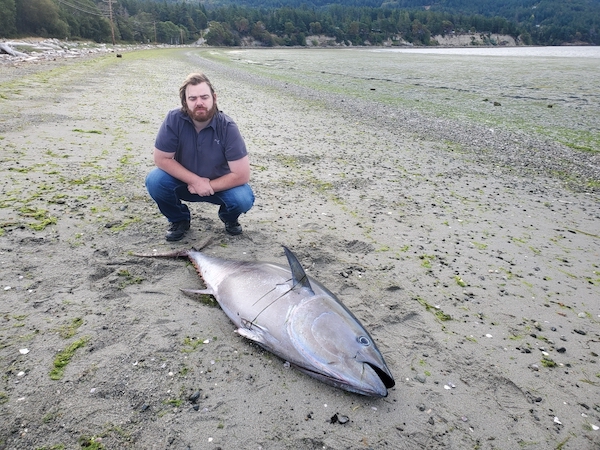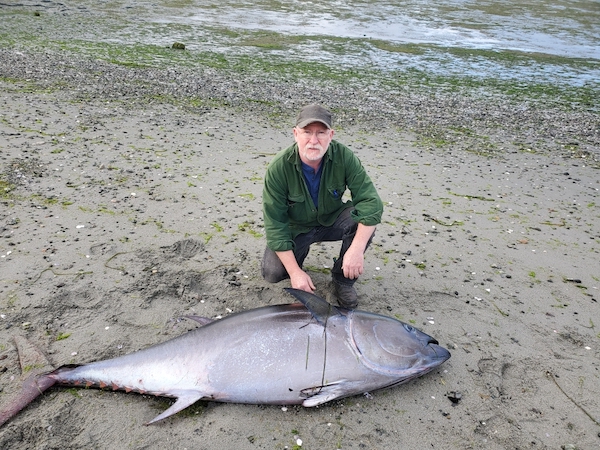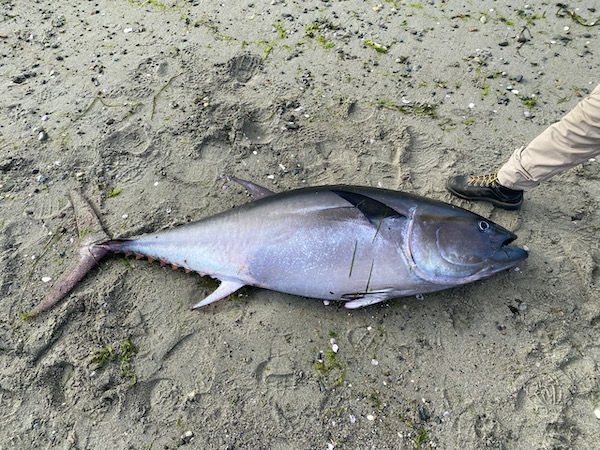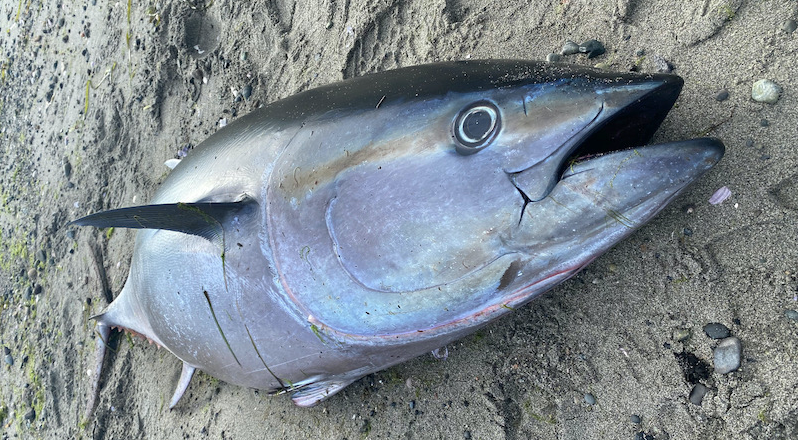||| FROM NORTHWEST SPORTSMAN |||
Orcas Island is known for odd visitors from the wildlife world – a pair of bull elk, a bear – but what apparently washed ashore overnight may take the cake.
A large Pacific bluefin tuna, an open-ocean species that is far, far, far more common in California’s offshore waters than the San Juan Islands.

JD LUNDQUIST KNEELS NEXT TO THE PACIFIC BLUEFIN TUNA WASHED UP AT THE HEAD OF ORCAS ISLAND’S EAST SOUND. (GARY LUNDQUIST)
Northwest Sportsman source and local landowner Gary Lundquist and his youngest son JD were headed to the ferry dock early this morning when they spotted a lump on Crescent Beach by the village of Eastsound and went to investigate.
“We saw it first thing. There was only one other set of tracks on the beach. It’s probably 5-foot, 60-something inches,” he said.
Crescent Beach lies at the top end of East Sound, a narrow inlet stretching from the heart of the San Juans past Olga and Rosario.
Lundquist described the fish as untouched, so it was likely deposited – or stranded – by last night’s midnight 8-foot-or-so high tide. This morning’s low was at 7:28 at nearby Friday Harbor on San Juan Island.
Northwest tuna fishing is dominated by albacore – the first sport-caught ones of the season were landed this week – but bluefin occasionally are caught. The state record bluefin is a 92.15-pounder caught off Ilwaco in 2019.
“I thought about throwing it in my truck,” Lundquist said, but ultimately didn’t, recalling episodes of Wicked Tuna that suggest that even if the exterior of a tuna looks good, the insides can go bad.
He said that as a kid in the San Juans, he recalled finding a washed up 5- or 6-foot shark that had had its tail cut off, but nothing ever like a bluefin here before.
Lundquist and his son had just finished cutting their hay yesterday and were running home today to grab their boat when they spotted the bluefin on the beach.
“I’ll start raking hay tomorrow keeping an eye out for zebras and giraffes,” he joked Tuesday evening.

GARY LUNDQUIST AND THE BLUEFIN. (GARY LUNDQUIST)
After the Lundquists headed for the ferry, the bluefin was collected by SeaDoc Society researchers for sampling and it was taken to the University of Washington’s Friday Harbor Labs where it will be dissected in the coming weeks, according to the society’s Joe Gaydos. He said the exam should help shed light on how the tuna died and came to be stranded on Crescent Beach.
“Right now, I can only say there didn’t appear to be any signs of trauma from net entanglement, nothing in the mouth like an old hook, but other than that, the animal was in good nutritional condition – really a beautiful specimen!” said Gaydos.

A MAN’S SIZE 12 BOOT NEXT TO THE TUNA FOR SCALE. (JOE GAYDOS, SEADOC SOCIETY)
He said that bluefin tuna have never been seen in the Salish Sea, per a complete list of all the fish species that occur in these sheltered inside saltwaters – and he found it ironic that one should happen to turn up on the same day as the book A Field Guide to Fishes of the Salish Sea was published. Needless to say, it does not list Thunnus orientalis.
(In another oddity, earlier this summer a Humboldt squid washed up on a Whidbey Island beach near Freeland.)
But a 2014 paper by a Canadian grad student detailing an indigenous midden on the west coast of Vancouver Island does mention finding bluefin bones there and states the species “was present nearshore in the past, and could be harpooned as it fed at the ocean’s surface at night.”
A 1997 fishery bulletin fleshes that out more, stating that vertebrae of bluefin estimated to have been 3 1/2 to 8 feet long and weighing from 103 to 645 pounds were found at native sites from Cape Flattery on Washington’s North Coast to Barkley and Nootka Sounds on the west coast of Vancouver Island to the Queen Charlottes, or Haida Gwaii.
Those are all ocean-facing locations and Orcas Island’s East Sound is tucked well up inside the San Juans archipelago, but it does get curiouser.
**If you are reading theOrcasonian for free, thank your fellow islanders. If you would like to support theOrcasonian CLICK HERE to set your modestly-priced, voluntary subscription. Otherwise, no worries; we’re happy to share with you.**








Maybe the SRKWs can learn to hunt tuna?
A wonderful piece about a fantastic species.
I am told local Orcas aliens may have scavenged some fine fresh tuna that morning. Nothing goes to waste in the cycle of life around here.